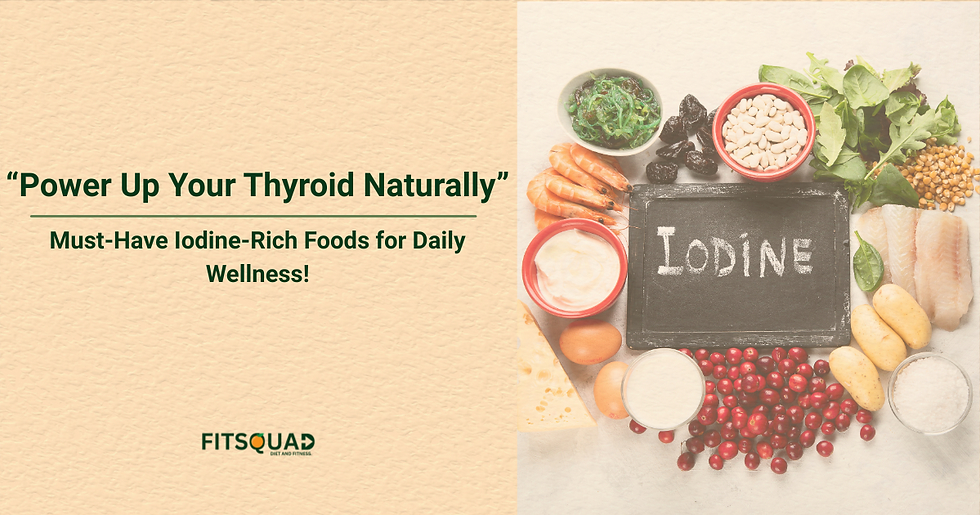Understanding the Role of Carbs in Your Diet
- fitsquadind
- Jan 7, 2025
- 4 min read
Updated: Apr 10, 2025

Carbohydrates—often labeled as the villain in weight loss stories—are actually one of your body’s most important fuel sources. Whether you’re a fitness enthusiast, managing weight, or just trying to eat smarter, it’s essential to understand the true role of carbs in your diet.
In this blog, we’ll break down what carbs are, how they affect your body, and how to balance them for energy, health, and fat loss. Spoiler alert: not all carbs are bad!
What Are Carbohydrates and Why Do We Need Them?
Carbohydrates are macronutrients, like protein and fat, and they are your body’s primary source of energy. Once consumed, carbs break down into glucose, which fuels your brain, muscles, and other tissues.
There are three main types of carbs:
Sugars – naturally found in fruits, milk, and also added to sweets
Starches – complex carbs found in grains, legumes, and vegetables
Fiber – a non-digestible carb that helps in digestion and heart health
According to the studies, 45–65% of your daily calories should come from carbohydrates. That’s right—carbs in your diet are essential, especially when they come from nutrient-rich sources.
Are Carbs Essential for Energy?
Yes. Glucose from carbohydrates is your brain’s preferred fuel. When you reduce carb intake too drastically, your body may shift into ketosis, breaking down fat for energy. While this can help some people lose weight, it’s not ideal or sustainable for everyone.
If you’re active or do high-intensity workouts, carbohydrates in your diet are critical to maintain stamina, performance, and recovery.
Good Carbs vs. Bad Carbs: What’s the Difference?
The real conversation isn’t whether carbs are “good” or “bad”—it’s about quality.
Healthy Carbs (a.k.a. Good Carbs)
Whole grains (quinoa, oats, brown rice)
Fruits and vegetables
Legumes (beans, lentils)
Dairy (milk, yogurt)
Nuts and seeds
These provide fiber, vitamins, and steady energy.
Refined or Processed Carbs (Bad Carbs)
White bread and pasta
Sugary drinks and dessert
Packaged snacks with added sugar
Fried fast foods
These cause rapid blood sugar spikes, leading to energy crashes and increased hunger.
The key? Include more healthy carbs and minimize processed ones for better blood sugar control and lasting satiety.
How Many Carbs Should You Be Eating?
There’s no one-size-fits-all answer. Your ideal carb intake depends on factors like:
Activity level
Body type
Health goals
Metabolism
Here’s a basic guideline:
Sedentary person: 45–50% of daily calories from carbs
Active individual: 55–60%
Endurance athlete: up to 65%
If you’re trying carb counting for weight loss or blood sugar management, aim for 20–30g of carbs per meal with 1–2 small snacks in between.
Carbs in Your Diet: Balancing for Health and Weight Loss
Balancing carbs in your diet doesn’t mean cutting them out—it means eating them strategically.
Low-Carb vs. High-Carb Diets
Low-carb diets (like keto) can help with short-term fat loss but may lack fiber and nutrients.
High-carb diets (rich in fruits, grains, legumes) can support active lifestyles and mental focus—when done right.
A moderate-carb, whole-food diet is often best for sustainable energy and weight management.
The Best Sources of Healthy Carbs
Here are carb-rich foods that also deliver key nutrients:
Sweet potatoes – rich in beta-carotene and fiber
Quinoa – high in protein and gluten-free
Oats – great for heart health and digestion
Fruits like apples, berries, and bananas – packed with antioxidants
Vegetables like carrots, beets, and green peas – high in vitamins and fiber
These are ideal for those aiming to include more healthy carbs without spiking blood sugar.
How to Track Carbs Without Overdoing It
If you’re watching your intake, here are easy tips for carb counting:
Read nutrition labels – check “Total Carbohydrates” and fiber (net carbs = total – fiber)
Use scales for tracking portion
Portion control – ½ cup of cooked rice or pasta = ~22g carbs
Balance your plate – pair carbs with protein and fats to slow digestion
Snack smart – swap chips for fruit + peanut butter or hummus + veggies
Tracking helps you eat mindfully—not obsessively.
Frequently Asked Question
Q. Can you lose weight on a high-carb diet?
Yes, if your carbs come from whole, unprocessed sources and you’re in a calorie deficit. It’s about food quality and balance.
Q. What are the best sources of healthy carbs?
Fruits, vegetables, legumes, oats, brown rice, and whole-grain products are top picks.
Q. How do carbs affect blood sugar levels?
Refined carbs spike blood sugar quickly. Whole carbs digest slower, offering a steady release of glucose and energy.
Q. Are carbs bad for weight loss?
No. Too many calories from any source cause weight gain. Moderate, balanced carb intake can support weight loss.
Q. Can I eat carbs and still maintain a healthy diet?
Absolutely! Carbs are part of a balanced diet. Focus on variety and whole food choices for the best results.
Conclusion: Carbs Aren’t the Enemy—They’re Essential
Despite the myths, carbs in your diet are not something to fear. They fuel your brain, support your workouts, and provide important nutrients. What matters most is the type and amount of carbs you eat.
Choose healthy carbs, track your intake if needed, and enjoy a balanced plate. After all, good health isn’t about avoiding food groups—it’s about eating smarter.
About Us
At Fitsquad, we believe in sustainable wellness through science-backed nutrition. Whether it’s building a balanced plate, understanding macronutrients, or decoding diets—we’re here to guide you.
Need a custom diet plan or carb-counting support?
Contact us at fitsquad.ind@gmail.com or visit. Fitsquad
Disclaimer
This blog is for educational purposes only. Please consult your healthcare provider before making significant changes to your eating plan, especially if you have existing health conditions like diabetes or thyroid issues.
_edited.png)


